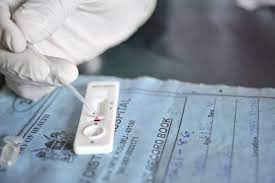


Rapid Diagnostic Tests for Tuberculosis
Before the Covid-19 pandemic, tuberculosis (TB) was the leading infectious cause of mortality worldwide, and still remains a leading cause of mortality worldwide, particularly in low- and middle-income countries (LMICs). In addition, estimates suggests that TB cases and deaths have increased substantially during the Covid pandemic.
Over the last several years, Dr. Paul Drain and colleagues have been working on developing and evaluating rapid diagnostic tests (RDTs) for SARS-CoV-2. Some of their results and findings were recently published in the New England Journal of Medicine.
To build upon the success of their research on COVID RDTs, they have been awarded a $4.7M grant from the Bill and Melinda Gates Foundation for their project “Prospective Validation of Novel Diagnostics for Tuberculosis in KwaZulu-Natal, South Africa: The PROVE TB Study” to develop and evaluate novel RDTs for Tuberculosis.
“My research group has been developing and evaluating RDTs for infectious diseases for over 10 years,” said Drain. “With these funds (and our experience and success from Covid) we aim to develop effective and accurate novel RDTs for TB. If we are successful, then widespread, rapid testing for TB could change the trajectory of TB cases and deaths around the world.”
Dr. Paul Drain, MD, MPH, is an associate professor of medicine (Allergy and Infectious Diseases) and global health. He is also associate director of the University of Washington Tuberculosis Research and Training Center.
Dr. Drain's clinical research focuses on evaluating rapid diagnostic tests and strategies, including novel point-of-care technologies, for infectious diseases in resource-limited settings.
The long-term goal of his research is to improve the diagnosis and treatment for tuberculosis, HIV, and HIV-related opportunistic infections. To achieve these goals, he has been conducting clinical research in eastern Africa since 2003 and in South Africa since 2010, where he has developed strong collaborations with the University of KwaZulu-Natal, the Centre for the AIDS Programme of Research in South Africa (CAPRISA), the KwaZulu-Natal Research Institute for Tuberculosis and HIV (K-RITH), and several clinical sites throughout South Africa's KwaZulu-Natal province and Chiang Mai, Thailand.
Dr. Drain also collaborates with bioengineering laboratories at the University of Washington, Harvard Medical School, and the University of California on the development and validation new rapid, clinic-based tests for infectious diseases in resource-limited settings.